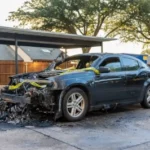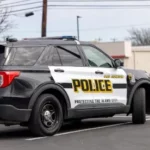
Texas Car Accident: When to Call Police & File a Report
WHY MAKING A POLICE REPORT IS CRUCIAL:
Getting into a car accident is a stressful experience, but knowing the legal requirements can help you navigate the aftermath. In Texas, specific laws govern when and how you must report a collision. Understanding these regulations is vital, not only for legal compliance but also to protect your interests, especially if you’re not at fault after a Texas car crash.
Let’s break down some key sections of the Texas Transportation Code that shed light on your responsibilities after a Texas car accident.
THE IMMEDIATE DUTY TO REPORT: TEXAS TRANSPORTATION CODE SEC. 550.026
Texas Transportation Code Sec. 550.026 outlines the immediate car accident reporting requirements for vehicle collisions. This section isn’t just a suggestion; it’s a legal obligation in certain circumstances.
According to this statute, if you’re involved in a collision that results in:
You are legally required to IMMEDIATELY and by the QUICKEST MEANS OF COMMUNICATION give notice of the collision to the appropriate authorities. Call 911.
The specific authority you should contact depends on the location of the accident:
It’s important to note that even if two municipalities or a county and municipalities have agreements about handling these reports (as mentioned in subsection (b)), your duty to report the collision remains unaffected. The key takeaway here is that if the Texas car crash is serious enough to cause injury, death, or render a vehicle unsafe to drive, you MUST report it promptly.
WHEN PEACE OFFICERS GET INVOLVED: TEXAS TRANSPORTATION CODE SEC. 550.041
Beyond your duty to report, Texas Transportation Code Sec. 550.041 details when a peace officer may investigate a collision. This section grants peace officers the authority to investigate a motor vehicle collision if it results in:
What’s particularly significant about this section is that a peace officer MAY investigate the collision and file justifiable charges relating to the collision without regard to whether the collision occurred on property to which this chapter applies. This means that even if the accident happens on private property, like a shopping center parking lot (unless it’s a privately owned residential parking area or a paid parking lot), an officer can still investigate and take action if the criteria for injury, death, or $1,000+ property damage are met. Either way, prudence would be to always request an Incident Report or Crash Report be made, regardless.
WHY REPORTING YOUR CAR CRASH MATTERS, ESPECIALLY IF YOU’RE NOT AT FAULT
While these laws outline your responsibilities, they also provide crucial protection. A formal police report, generated from your immediate notification, serves several vital purposes after a Texas car accident:
In summary, don’t delay reporting a significant car accident in Texas. Understanding and adhering to Sec. 550.026 and Sec. 550.041 of the Texas Transportation Code is not just about following the law; it’s about safeguarding your well-being and ensuring a smoother path to recovery and compensation if you find yourself in the unfortunate event of a car collision in Texas.
For serious car accidents, contact Tomas A. Caquias Esq MSTC at Caquias Law Group, PLLC in Harlingen, Texas or San Antonio, Texas for a free consultation. We handled personal injury cases for injury victims across Texas. Follow us on instagram and facebook @CaquiasLaw to learn more.








The information contained in this website is provided for informational purposes only, and should not be construed as legal advice on any matter. The transmission and receipt of information contained on this Web site, in whole or in part, or communication with Caquias Law Group, PLLC via the Internet or e-mail through this website does not constitute or create a lawyer-client relationship between us and any recipient. Read More